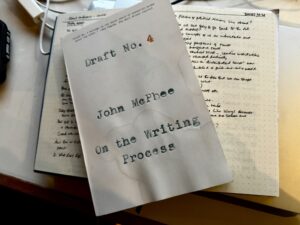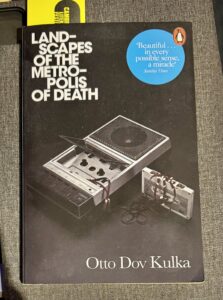Anyone for punting?

Quote of the Day
”Of course I talk to myself. I like a good speaker, and I appreciate an intelligent audience.”
- Dorothy Parker
Musical alternative to the morning’s radio news
If Ever I Would Leave You | Trumpet Solo by Sal Grippaldi
Long Read of the Day
What John McPhee Taught Generations of Writers and Journalists

My battered copy of an invaluable guide.
Peter Hessler’s essay on a beloved mentor and tireless proponent of ‘Creative Nonfiction’. Sounds like an oxymoron, I know, but it’s anything but.
Sample:
I first became a McPhee reader in the margins of the essays that I submitted for class. He marked every paper in pencil, in a tight left-handed script. He crossed out words, and he drew boxes around phrases, and he inscribed long comments that sometimes ran perpendicular to the text. “You can’t make a silk purse out of this,” he wrote, in response to one of my poorly executed descriptions. Next to a sentence with oddly formal phrasing, he remarked, “This could be said with several pebbles removed from the mouth.” Once, when I used a subject’s name four times in the span of two sentences, McPhee wrote, “Listen to the character’s name thudding like horseshoes. Vary it. Use pronouns here and there.”
Other comments thudded in a way that made horseshoes seem soft:
“This sort of thing is irritatingly repetitive.”
“The incongruity in this line isn’t artful, it’s just awkward.”
“I wish you would listen more critically to the rhythms and sound of the prose.”
“You are extraordinarily repetitive for someone who writes on your level.”
“This is lame cleverness.”
But…
there were also many instances of praise, when John McPhee wrote in the margins “yes,” or “ah,” or “a fine moment.”
Lovely. Do read it.
So many books, so little time

In a way, I’ve been avoiding this book for years. But I’ve always kept it on my desk or on a nearby shelf, awaiting the moment when I could confront it. Its author, the historian Otto Dov Kulka dedicated his life to studying and writing about Nazism and the Holocaust. But for a long time he set to one side his personal experiences as a child inmate at Auschwitz. In the book he brings together the personal and historical, in a devastating — and yet sometimes poetic — account of the concentration camps and the private mythology he had constructed around those experiences.
There’s one searing passage when he recalls how a harmonica somehow came into his possession.
I learned to play it and I played things that entered my mind, including one of the melodies we sang in the children’s choir… and a young Jewish prisoner from Berlin comes up to me — I was then a boy of 11 — and says, “Do you know what you are playing?” And I tell him: “Look, what I am playing is a melody we sang in that camp which no longer exists.” He then explained to me what I was playing and what we sang there and the meaning of those words. I think he also tried to explain the terrible absurdity of it, the terrible wonder of it, that a song of praise to joy and to the brotherhood of man Schiller’s ‘Ode to Joy’ from Beethoven’s Ninth Symphony, was being played opposite the crematoria of Auschwitz, a few hundred metres from the place of execution, with the greatest conflagration ever experienced by that same mankind that was being sung about was going on at the very moment we were talking and in all the months we were there.
Linkblog
Something I noticed, while drinking from the Internet firehose.
- Elon Musk discovers Trump doesn’t stay bought Nice piece on why even vast amounts of money doesn’t buy you appreciation from Trump. Couldn’t happen to a nastier guy. Link
This Blog is also available as an email three days a week. If you think that might suit you better, why not subscribe? One email on Mondays, Wednesdays and Fridays delivered to your inbox at 5am UK time. It’s free, and you can always unsubscribe if you conclude your inbox is full enough already!
